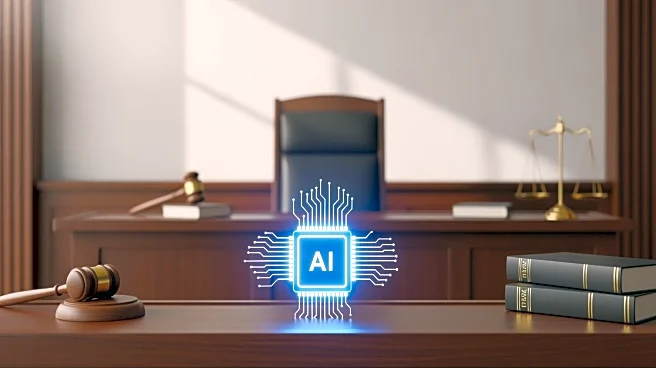What's Happening?
Artificial intelligence (AI) is increasingly being integrated into the U.S. legal system, with judges, clerks, and law firms utilizing AI for drafting, summarizing, and streamlining legal processes. Some
courts are even experimenting with AI to predict outcomes or suggest sentencing. This development has sparked a debate within the legal community about the extent to which AI should be involved in judicial processes. While AI offers efficiency, there are concerns about its ability to replace human judgment, which is essential for fairness, accountability, and transparency in the legal system. Some courts have already banned AI in affidavits and witness statements due to issues like AI hallucinations, where fake cases are cited.
Why It's Important?
The integration of AI into the legal system has significant implications for the pillars of justice, including fairness and accountability. Human judgment, despite its flaws, provides ethical reasoning and sometimes mercy, which machines cannot replicate. The use of AI in legal decisions could lead to outcomes based solely on data patterns, potentially undermining the promise of an independent and impartial tribunal. This shift could affect public trust in the legal system and alter the traditional roles of legal professionals, who may rely more on AI for tasks that require human insight.
What's Next?
Legal professionals are advised to audit their workflows, document AI-generated outputs, and update contracts to address AI use. As AI continues to take over certain legal tasks, the focus should remain on preserving human judgment in legal processes. The future of law may be digital, but accountability must remain human. Legal professionals must ensure that AI serves as a tool rather than a decision-maker, maintaining the integrity of legal judgment.
Beyond the Headlines
The ethical implications of AI in the legal system are profound. As AI becomes a normal tool, there is a risk of diminishing the critical questioning of legal arguments. The reliance on AI could lead to a generation of lawyers who may not fully engage with the nuances of legal reasoning. This development calls for a careful balance between leveraging AI for efficiency and preserving the human elements that define justice.










